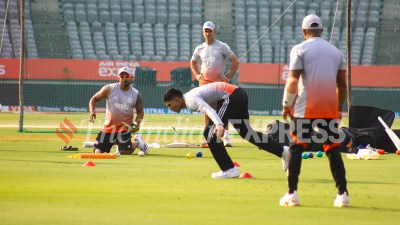Stay updated with the latest - Click here to follow us on Instagram
Court transfers two anti-Sikh riots cases
A Delhi court on Thursday transferred the two 1984 anti-Sikh riots cases,allegedly involving Congress leader Sajjan Kumar and others,from Special CBI judge to a sessions court.
All accused,including Sajjan Kumar,asked to appear before ASJ on Monday
A Delhi court on Thursday transferred the two 1984 anti-Sikh riots cases,allegedly involving Congress leader Sajjan Kumar and others,from Special CBI judge to a sessions court.
Indisputably,Delhi is one sessions division and any Additional Sessions Judge can try the case. This is not a case under the Prevention of Corruption Act. The chargesheets were assigned to Additional Chief Metropolitan Magistrate of the North East district who conducted the committal proceedings,so the cases are allocated to Additional Sessions Judge (NE) Sunita Gupta, District and Sessions Judge G P Mittal said.
The court directed all the accused as well as the CBI counsel to appear before ASJ Gupta
on April 5.
Earlier,the court reserved its order on a plea of a co-accused seeking transfer of riots cases from a special court to a judge having local jurisdiction.
The court heard the arguments of CBI counsel D P Singh and V K Malik,counsel of Khushal Singh,a co-accused in the matter. During arguments in the matter,Malik submitted that it was illegal to try an offence before a court which does not have jurisdiction in the matter.
He contended that Delhi has been divided into nine judicial districts and so the cases relating to killings of the victims during the riots should be tried at the courts having proper jurisdiction. Malik submitted that since the cases in which CBI filed the chargesheet related to the offence that took place in Sultanpuri and Delhi Cantonment areas,they should be tried at Rohini and Dwarka courts respectively.
However,D P Singh,counsel for CBI,said that the application of the accused has already been disposed of by a special CBI judge at Karkardooma.
The CBI counsel also submitted that the file has been sent only for administrative purposes for proper allocation of the cases. The CBI,which claimed that the files related to two cases were sent by Additional Chief Metropolitan Magistrate (ACMM) to the Special judge at Karkardooma,was put some tough questions by the judge.
Who gave power to the ACMM. Does the ACMM has the power to send a file to a
special court, the District
Judge said.
Appearing for the complainant,senior advocate H S Phoolka submitted that the accused had already accepted the jurisdiction of the Karkardooma court by filing anticipatory bail petition before it.
Phoolkas submission led to a heated argument with the counsel for the accused opposing his plea alleging that he did not have right to speak in the matter to which Phoolka shot back saying the matter related to public sentiments and involved larger interest of the community.
A special CBI court at Karkardooma had on March 27 disallowed the plea of Khushal who had sought transfer of cases,raising objection over its jurisdiction,but had sent the case files to the district judge to seek proper allocation for hearing.
On March 20,ACMM had declined to take on record an application of Kumar seeking certain documents related to the chargesheet filed against him in the riot cases and directed them to appear before the CBI court.
The High Court had on February 8 asked the trial court to put the anti-Sikh riot cases on fast track with a direction to wind up the proceedings within six weeks.







